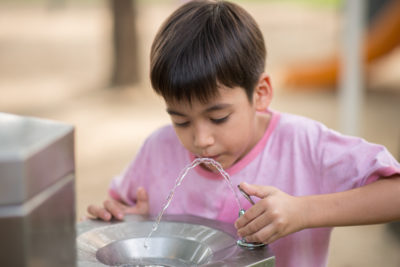

We celebrated Lead Poisoning Prevention Week last week as toxic lead continues to make headlines in North Carolina. Testing programs have recently turned up the hazardous substance in drinking water and older buildings around the state, from UNC Chapel Hill’s campus to child care centers statewide. Testing for lead is a vitally important first step to removing lead from the human environment.
Whether you’re a parent, child care provider, pediatrician, or an elected official, you have a role to play in ending childhood lead poisoning in North Carolina. During pregnancy, and when babies and toddlers are crawling and exploring their environments, lead exposure poses the greatest long-term risks to health and development. That’s why NC Child has partnered with programs around the state to advance lead prevention, funding, testing, and clean-up programs aimed at our youngest children.
Lead exposure is preventable
The best way to protect kids from lead exposure is to be proactive about getting rid of lead. Don’t wait for a child to be found with lead in their body.
- Explore the resources at LeadFreeNC.org to learn about easy steps to lead prevention at home and in child care facilities.
- Does your home contain lead risks? Explore the new Lead Paint-Safe Housing Database to look up your home and find out about your lead risk.
- Check out a Healthy Homes event near you. Our friends at PEACH Durham are hosting a Lead-Safe Healthy Homes Community Event on Saturday October 29th in Durham.
The role of pediatricians and other clinicians
Clinicians play a key role in preventing lead risk, identifying and treating lead poisoning, sharing data about lead poisoning cases, and advocating for public health measures to address the problem. LeadFreeNC.org helps clinicians connect with training resources, environmental health specialists, and materials to share with patients’ families.
Public policy is key to ending lead poisoning
Our vision is to end childhood lead poisoning in North Carolina. Working together with partners from the Duke Environmental Law & Policy Clinic, NC Division of Public Health, RTI International, and thanks to support from the Duke Endowment, we have helped advance policies and programs that are reducing children’s lead exposure and bringing us ever closer to that goal.
We have worked successfully with the General Assembly and other officials to:
- Protect 30,000 young children each year from lead in drinking water, by lowering the “action level” for when lead is found in drinking water at child care centers. HB 272, “Revise Health Standard for Lead,” passed in 2021.
- Ensure that every child care center in the state is testing their drinking water for lead. This new requirement — and the funding to support it — passed in 2019 with support from the North Carolina Licensed Child Care Association and its members.
- Make sure that when lead is found in child care centers and schools, the clean-up happens too. During the last legislative session, the General Assembly allocated $150 million in federal relief funds to test for and remove lead and asbestos in schools and child care centers across the state.
These preventive measures will go a long way in protecting millions of North Carolina children from exposure to dangerous toxics in the places where they learn.
Check out the new Lead Paint-Safe Housing Database to look up your home and find out about lead risk — and how to prevent exposure.




